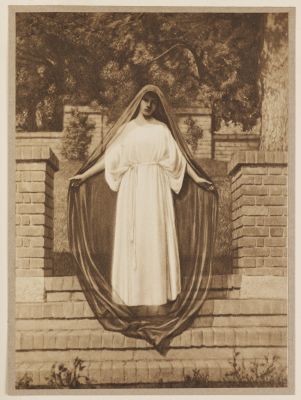
Title
Plate VArtist
Hanscom, Adelaide (American, 1876-1932)Publication
Sonnets From the PortugueseDate
1916Process
CollotypeImage Size
16.5 x 9.2 cmSheet Size
25.4 x 18.8 cm
Adelaide Hanscom Leeson was a pioneer in the use of fine art photography in the illustration of literary works. She is credited with being among the first to publish a book with photographs incorporating male nudity in America. In 1902 she opened her first photographic studio in San Francisco. In 1905, after three years of work, she published Rubaiyat of Omar Khayyam, a work which caused a sensation. Drawing upon her earlier art education, Hascom heavily manipulated her negatives and prints, the ultimate extension and expression of her pictorialist philosophy. The delicate tissue photogravures straddled a fine line between photography and illustration.
The 1906 San Francisco earthquake and fire destroyed her studio and negatives (including those for the Rubaiyat of Omar Khayyam). Hanscom moved to Seattle and opened a studio in partnership with Gertrude Wilson, where her work quickly attained prominence locally, perhaps helped by Alfred Stieglitz naming her as part of the Photo-Secession, and and by his inclusion of her work in one of his members-only shows. She was the only Washington resident to be be included by Stieglitz. Hanscom began work on the photographic illustrations for Browning’s "Sonnets" immediately after arriving in Seattle, though the road to the completion of the work was a long one. She married in 1908, to a British-born former Mountie named Gerald Leeson, becoming Adelaide Hanscom Leeson. Her husband’s work took them for much of the year to Alaska, but she would return to Seattle each year, and kept her studio there through ca. 1911. After her marriage (and two children), work on the substantially completed "Sonnets" slowed to a crawl. The family moved to Danville, California in 1912. She finally completed the work in 1916. [1] [2]
References
[1] Yeo SC Leeson AH. A Different Slant of Light : The Art and Life of Adelaide Hanscom Leeson. 1st ed. Anacortes WA: Orange Trumpet Honeysuckle Pub; 2002.
[2] Indvik, Gail Marie; Dimitri Shipounoff (1981). Adelaide Hanscom Leeson: Pictorialist Photographer 1876–1932. Carbondale: Southern Illinois University. pp. 1–18.

